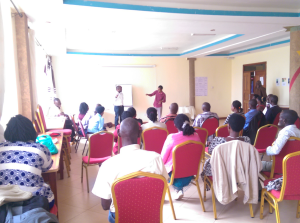
Since its inception in 2004, SPIDER (Swedish Programme for ICTs in Developing Regions) has recognised education as a fundamental human right that enables people to take part in society and lift themselves out of poverty. Education in low-resource settings is generally underfunded.
This becomes more apparent as students in need of special accommodations go without their requirements being met, thus preventing them from accessing education. The new development agenda as reflected in the SDGs and the Africa Agenda 2063, specifically goal 4 (providing quality education for all) and goal 10 (reducing inequalities), cannot be reached unless we address disabilities, discrimination, and stigmatisation. Against this background, the Uganda National Association of the Deaf (UNAD) together with SPIDER entered into a two-year partnership to implement the “Digitalising Uganda Sign Language project.”
Uganda Sign Language (USL) is an official language in Uganda and is an important component of the process of integrating Deaf people into the community. Approximately 1,200,000 people in Uganda use USL, and roughly 98% of them are Deaf.
Teaching USL has been limited to manual-training materials, which present their own challenges in content upgrade and are also expensive to maintain, issues that render them not sustainable. This has created the need for the project, which aims at providing digital access to USL learning through innovation, while at the same time maintaining its originality. The project was launched on March 1st, 2017, and the team is currently creating digital content in the form of videos tutorials for platforms like social media, YouTube, an eLearning web portal, a mobile app, and DVDs. The goal is to make learning and teaching sign language readily available, accessible and convenient for both the learner and the sign-language instructor.
The project combines research, user-centred design, and follow-up activities to develop content that meets the needs and aspirations of the different categories of learners such as Deaf children, teachers, health workers, police and family members, as well as sign-language instructors. The general objective is to elevate blended learning. UNAD builds on the wider partnership of key stakeholders from various sections including institutions of higher learning, government agencies, civil society organisations, Deaf people, sign-language experts, and service providers. It strives to galvanise efforts to ensure that the digital content for learning sign language is available, effectively utilised, and positively impacts Uganda’s Deaf community. There is insufficient data on people with disabilities, and this constrains international organisations’ ability to monitor improvement of the situation (UNESCO, 2015). SPIDER is aware of this, and we have reviewed our policy and practice regarding research for the programme period of 2015-2019. For more information, please read this brilliant blog post by Edna Soomre.
SPIDER supports research institutions in partner countries by hiring local researchers, who know the languages and cultures, are aware of national and regional priorities, and are in a position to perceive situational nuances that foreign researchers might miss. Each SPIDER project has an integrated research component that undertakes periodic quality assurance measures or assessments. This ensures the participation of the target groups, whose opinions and possible objections constitute valuable input to the ensuing stages of the implementation process.
This work is led by Dr. Caroline Wamala Larsson, Programme Manager for Research. SPIDER works closely with Betty Najjemba, the Project Researcher. Betty has carried out a baseline study examining the level of ICT use and accessibility for sign language in Uganda’s various regions. This will help her and the team at UNAD in understanding the end-user experiences, expectations and the challenges in utilising Uganda’s digital sign-language content.
There are obstacles ahead. Variations in sign language across Uganda’s Deaf community complicate the effort to standardise signs. Another linguistic issue is that Uganda Sign Language, like any developing language, has a limited vocabulary, which impedes the process of creating a broader lexicon and making it utilisable by both the Deaf community and the population at large. Furthermore, the entire project effort is hampered by poor ICT infrastructure in the country’s remote areas. The research findings so far are promising, and the data from the needs assessment and baseline show that ICTs are already being used by Uganda’s Deaf population. To learn more about the progress, lessons learned, and the way forward, please join us at eLearning Africa on Thursday, September 28th, 12:15-13:00.
Magda Berhe Johnson, Head of Education and Learning Programme at Spider
Simon Eroku, Information Officer at UNAD
eLearning Africa 2017
The eLearning Africa 2017 conference will be hosted Balaclava, Mauritius on 27th – 29th September 2017.






